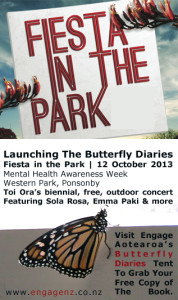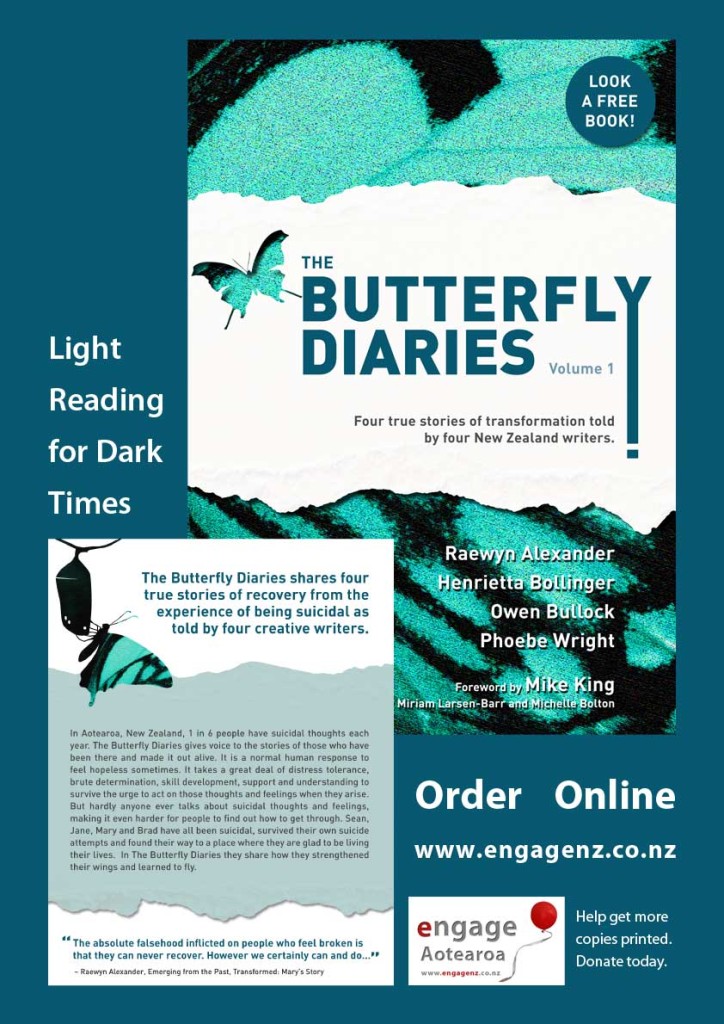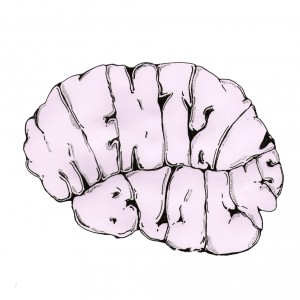The Butterfly Diaries Volume 1 is a FREE book of inspiring stories and personal tips from four people who have recovered from the experience of being suicidal.
Launch Details:
NOTE: Event Moved to Sunday 13th of October due to rain forecast for Saturday the 12th.
Engage Aotearoa will be launching The Butterfly Diaries Volume 1 at Fiesta in the Park on the 13th of October for Mental Health Awareness Week. Come along to the free public concert and pop into The Butterfly Diaries Tent – a quiet corner covered in white paper butterflies where you can stop by to decorate a butterfly with a survival tip of your own, pick up a copy of the book, relax with a copy in the reading corner or listen to the authors and editors read from the book.
- Where: Fiesta in the Park, Western Park, Ponsonby, Auckland
- When: From midday Sunday 13 October 2012
Reading Times:
12:30 – 1:00 pm Michelle Bolton reads from Breathe and Breathe and Breathe by Phoebe Wright
1:30 – 2:00 pm Owen Bullock reads from Enough Angels
2:30 – 3:00 pm Miriam Larsen-Barr reads from Welcome to Today by Henrietta Bollinger - 3:30 – 4:00 pm Raewyn Alexander reads from Emerging from the Past, Transformed
The Butterfly Diaries, Volume 1
Four true stories of transformation told by four New Zealand writers.
- Stories by Raewyn Alexander, Henrietta Bollinger, Owen Bullock and Phoebe Wright.
- Foreword by Mike King
- Edited by Miriam Larsen-Barr and Michelle Bolton
In Aotearoa, New Zealand, 1 in 6 people have suicidal thoughts each year. It is a normal human response to feel hopeless sometimes. It takes a great deal of distress tolerance, brute determination, skill development, support and understanding to survive the urge to act on those thoughts and feelings when they arise. But hardly anyone ever talks about suicidal thoughts and feelings, making it even harder for people to find out how to get through. The Butterfly Diaries gives voice to the stories of those who have been there and made it out alive. Sean, Jane, Mary and Brad have all been suicidal, survived their own suicide attempts and found their way to a place where they are glad to be living their lives. In The Butterfly Diaries they share how they strengthened their wings and learned to fly.
The first edition of The Butterfly Diaries Volume 1 will be placed in high-schools and GP waiting rooms across the NZ, to make recovery stories easy to find. Suicide rates peak among youth and most people who are suicidal visit a GP in the months leading up to making an attempt, even if they do not talk about how they are really feeling.
How to Order Copies
You can nominate a service or person to receive a copy of The Butterfly Diaries or order a copy for yourself by making a donation on the Engage Aotearoa website to cover the cost of posting your book. Just fill in your details and give the delivery address in the space provided. The minimum donation is set at NZ$2.50 (the cost of NZ postage and handling). A donation of $5 will get a copy posted for you and cover the costs of printing a copy for someone else.
Click here to order a copy of The Butterfly Diaries
Contact Engage Aotearoa for more information
Want to help prevent suicide in NZ?
You can help get more copies of The Butterfly Diaries out there for people to read. Sponsor a print run by making a donation on the Engage Aotearoa website. Every donation over $5 is tax deductible. A $20 donation pays for eight more books. A $500 donation prints enough books for a small school.











